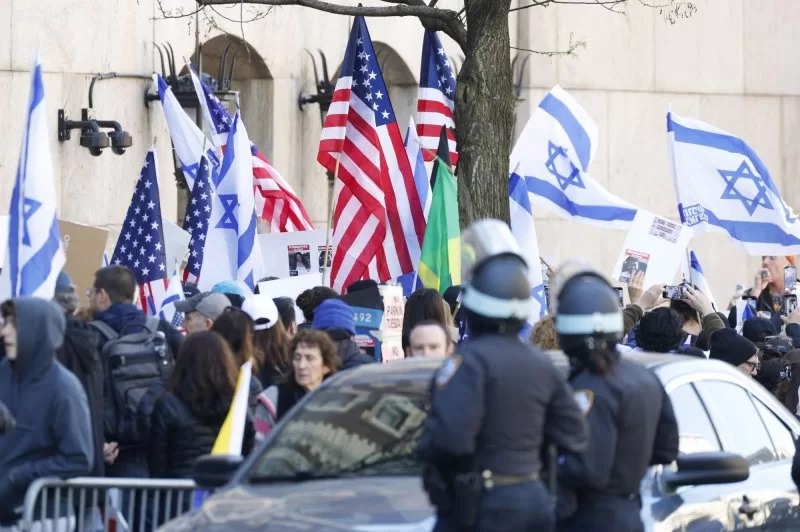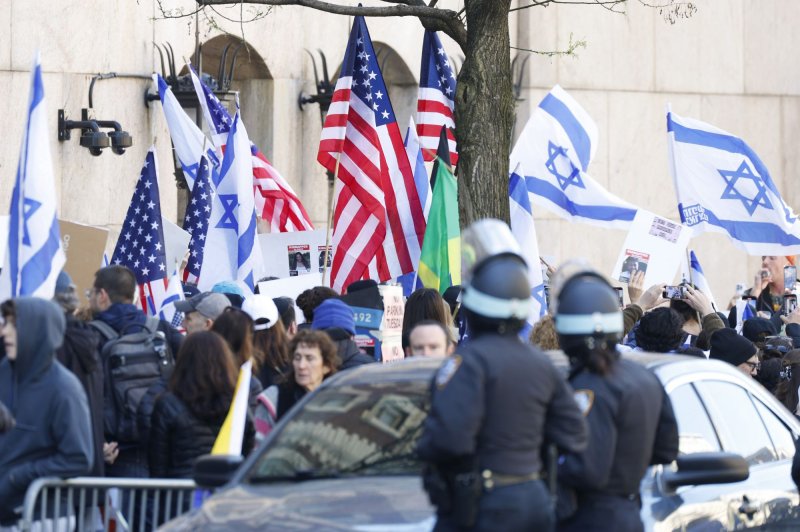1 of 8 | Pro-Israeli counter-protesters hold a rally outside of Columbia University in New York on Friday. The university announced that classes would be held remotely starting Monday, as pro-Palestinian protests have continued for almost two weeks on the school’s campus. Photo by John Angelillo/UPI |
License PhotoApril 26 (UPI) — Pro-Palestine protests and encampments have spread across the United States, leading to the arrests of hundreds and an increasing administrative nightmare for college officials.
Protesters throughout the United States are mainly calling for their respective universities to cut financial ties with entities connected to Israel in response to the war in Gaza.
While none of the demonstrations have led to divestments of funds, they have forced universities to move some classes online and cancel graduation ceremonies.
Demonstrators at New York’s Columbia University, the epicenter of the demonstrations, last week called for the university to end its relationship with Israeli academic institutions and a “complete divestment” of funds from pro-Israel entities.
Columbia’s president Nemat “Minouche” Shafik called for the New York City Police Department to remove people who were encamped on the South Lawn of the campus, “in violation of the university’s rules and policies.”
Law-enforcement officials said they arrested more than 108 people on April 18.
Rep. Alexandria Ocasio-Cortez, D-N.Y., condemned Shafik’s actions on behalf of the protesters. Her remarks followed fellow New York Democratic Rep. Jamaal Bowman, who accused Columbia of “caving to right-wing pressure.”
Shafik, however, faces pressure from the right, as well. House Speaker Mike Johnson, R-La., called for her resignation after a crowd of protesters repeatedly interrupted him and other GOP lawmakers during a press conference at Columbia on Thursday.
Student protest leaders on Friday said they are still in negotiations with university leadership, but the university’s offers still fall short regarding divestment from Israel-linked organizations and amnesty for students and faculty who have been punished for their involvement in the protests.
Protests and counter-protests continued Friday at Columbia, leading with hundred’s of pro-Israel demonstrators holding images of hostages taken by Hamas on Oct. 7 and chanting “Bring them home now! Alive!”
Later in the day, the space became occupied by a large group of pro-Palestine Hasidic Jews holding signs that read “All Palestine must be returned to Palestinian Sovereignty” and “Judaism Rejects Zionism.”
The situation at Columbia has spread and engulfed colleges and universities across much of the United States over the past week.
More than 100 people on Friday set up tents in front of the administrative building of the University of North Carolina at Chapel Hill, according to the campus newspaper The Daily Tar Heel. The event was organized by UNC’s chapter of Students for Justice in Palestine.
The group issued a statement saying it stands “in solidarity with our comrades at Columbia and across the U.S. who have been repressed, arrested, and physically attacked,” and that the purpose of the demonstration was to “center Palestine and call attention to the university’s participation in the genocide in Gaza.”
SJP said it has called on the university to divest funds since October, and there has been no change in the administration’s response.
More than 50 encamped protesters occupied campus Thursday and Friday at George Washington University, according to the campus newspaper the GW Hatchet. Demonstrators remained the U-Yard past the 7 p.m. deadline set by administrators to clear the encampment but have yet to face serious pressure from campus police.
Students from nearby colleges, including Georgetown University, American University, George Mason and the University of Maryland later joined student protesters at George Washington.
About 200 students linked arms at Illinois’ Northwestern University on Friday to protest what they called censorship from the university and to call for it to divest funds from Israel.
Administration officials said the demonstrators had largely dispersed and removed their tents later in the day. Students who refused were cited by campus police. No arrests were made.
The University of Florida took a hardline stance Friday after two days of pro-Palestine protests.
The university threatened suspension and banishment from campus for three years for protesters if they violate a host of behavior-related rules. Employees or professors caught breaking those rules will be fired, the school said.
Campus police said they have not yet made any arrests during the largely peaceful protests at UF.
Some of the rules include prohibiting protesters from using bullhorns, possessing weapons or protesting inside campus buildings. Other rules were vague, such as one prohibiting “disruption.” Permitted activities include “speech,” “expressing viewpoints” and “holding signs in hands,” according to the university.
Dozens of protesters at Emory University in Atlanta camped out on Thursday until police officers deployed what they called “chemical irritants” to break up the demonstration.
Twenty-eight people were arrested, including 20 students and faculty, according to university officials.
First appearance hearings for the Emory protesters began Friday in DeKalb County. One of the first was Emory University Economics professor Caroline Fohlin, a tenured professor of 13 years who was charged with disorderly conduct and simple battery against a police officer, according to county jail records.
DeKalb County Magistrate Court Judge Ann Guerrant ordered no restrictions on students and faculty involved in the protest per the university’s request.
Police arrested 57 people who refused to disperse from a protest Wednesday at the University of Texas at Austin, according to the Travis County Sheriff’s Office.
All people who were arrested have since had their cases disposed after the county attorney’s office determined they “lack sufficient probable cause to proceed.”
UT-Austin on Friday placed the protest’s organizers, the Palestine Solidarity Committee, on “interim suspension,” citing the “alleged violation of institutional rules.”
The University of Southern California on Thursday cancelled its main graduation ceremony after students set up an encampment Wednesday. Police arrested 93 people after ordering them to disperse.
Police on Thursday arrested 36 demonstrators at Ohio State University after they refused to disobey orders to disperse. University spokesperson Benjamin Johnson said 20 of those people were not affiliated with the university, and 16 were students.

